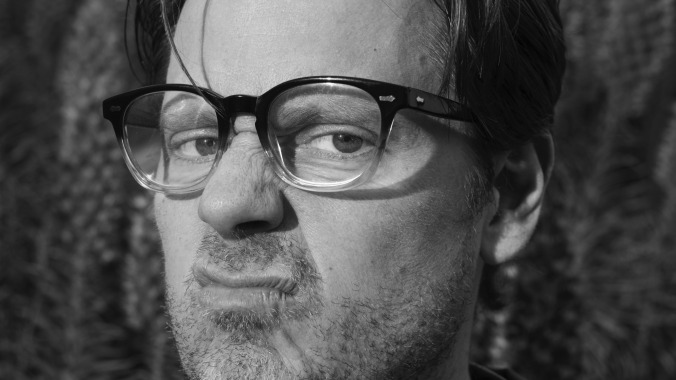Tim Heidecker Slips Out of Laughter
The comedian, singer-songwriter and actor talks apocalyptic writing, performing with his daughter, how balancing a career of stand-up and music has finally paid off, the evolution of his Very Good Band, and how a sibling of an SNL alum became an unlikely part of his new album, Slipping Away.
Photo by Chantal Anderson
Few comedians have had a thumb on ha-ha culture more than Tim Heidecker, who—along with his partner-in-crime, Eric Wareheim—has amassed a two-decade milieu unrivaled. If the only thing he ever contributed to the 21st century zeitgeist was Tim and Eric Awesome Show, Great Job!, his reputation would be safe. But he’s also made Tim and Eric’s Billion Dollar Movie and An Evening with Tim Heidecker, appeared in Bridesmaids, The Comedy, Us, I Think You Should Leave, Eastbound & Down, Check It Out! with Dr. Steve Brule and The People’s Joker. Later this year, he’ll appear in Pavements as Matador Records exec Gerard Cosloy. His call-in show Office Hours remains an institution. So, what else could Heidecker possibly have left to conquer? Well, the next great American rock album, of course.
Slipping Away is not Heidecker’s first dance with recorded music—in fact, it’s his fifth studio album (eighth, if you consider Cainthology, Titanic and Other Songs and Too Dumb for Suicide to be canon). He’s been writing and singing tunes professionally for more than 20 years, coming up in Philly rock bands and chumming it up with Ben Folds and Regina Spektor in 2008. When Awesome Show was still on, Davin Wood was tapped as the composer but Heidecker wrote and sang often. The two would form a duo together and, in 2011, release a soft rock-inspired record called Starting from Nowhere—a big, affectionate riff on Randy Newman, Warren Zevon and Boz Scaggs, fixtures of yesteryear still near and dear to Heidecker’s creative output.
As Bob Dylan was gearing up to release Tempest in the fall of 2012, Heidecker made “Titanic,” a 14-minute spoof of the rumor that the Bard was going to release a 14-minute song of his own about the RMS Titanic. It remains one of Heidecker’s greatest comedic works, as do his later Dylan parodies, like “Running Out the Clock” and “Long Black Dress.” I imagine that, in order to write a faithful ode to one of the greatest songwriters ever, you have to study the way he works. “None of this stuff is building skyscrapers. You learn how to build a basic track and how the bass should work, how you can use a tambourine in certain places,” Heidecker says. “Sometimes, I wasn’t feeling very inspired, or I didn’t have a song idea. I’d be like, ‘Can we try to record the first three minutes of “Hey Jude” just by listening to it and listening to exactly what they’re doing, trying to emulate the sounds?’ Of course, it comes out sounding like shit, but it’s teaching you. ‘Oh, it’s just the piano and the guitar here? That’s cool.’ ‘But it sounds so big. Why does it sound so big? Oh, there’s all this compression on it.’ You figure some of that stuff out that way.”
But now, Heidecker is in a place where imitation is just the first step toward originality. The first syllable of songwriting itself comes from just listening to music. “Sometimes I’ll get into habits of ‘Oh, fuck, I don’t know how to write any song that doesn’t sound like a Randy Newman song.’ How do I break that mold? People gave me shit for ‘Well’s Running Dry.’ When I was demonstrating it to the band, it sounded like the Fleetwood Mac lick in ‘Never Going Back Again,’” he says. “But, that’s just your point of reference—your jumping-off point. Once the band takes it and the song starts, it doesn’t sound like that at all anymore. But that’s how you write; you start by almost covering something or trying to emulate a certain sound or certain voice. And then, it goes off on its own.”
Heidecker began writing Slipping Away on his first tour with the Very Good Band (Eliana “Ellie” Athayde, Josh Adams, Vic Berger and Connor “Catfish” Gallaher) in 2022. “I usually don’t write on the road,” he says, “but in this case, we had a guitar backstage that my bass player Ellie brought along with her. It was one of just one of these instruments that you felt like you wanted to hold and pick around with. That started early, where the music was around me all the time.” Heidecker found himself always either on a bus with musicians or backstage talking music before and after gigs. About 40% of Slipping Away germinated from venue pianos or guitar noodling during downtime. When he returned from tour, Heidecker felt inspired to not only keep writing songs, but to keep the Very Good Band together. “I had put [the band] together for that tour, but we really bonded,” he says. “It was like, ‘All right, the next logical thing would be to try to make a record with this band.’”
-

-

-

-

-

-

-

-

-

-

-

-

-

-

-

-

-

-

-

-

-

-

-

-

-

-

-

-

-

-

-

-

-

-

-

-

-

-

-

-








































